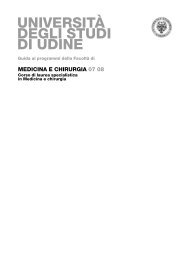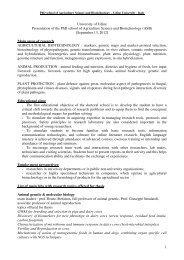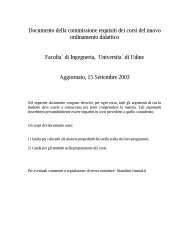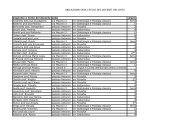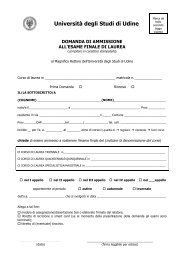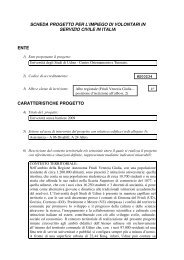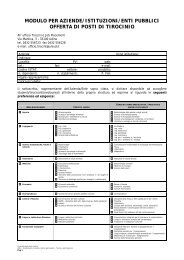â¢GUIDA ECONOMIA 07-08 - Università degli studi di Udine
â¢GUIDA ECONOMIA 07-08 - Università degli studi di Udine
â¢GUIDA ECONOMIA 07-08 - Università degli studi di Udine
Create successful ePaper yourself
Turn your PDF publications into a flip-book with our unique Google optimized e-Paper software.
prospectus u<strong>di</strong>ne<br />
199<br />
Lecture topics will include:<br />
1. Business Administration<br />
2. Concepts of Financial Accounting<br />
3. A conceptual framework for Financial<br />
Accounting<br />
4. Economic concepts of capital and<br />
income<br />
5. Accounting systems and accounting<br />
information: an accounting theory<br />
6. The measurement and valuation of<br />
assets and liabilities<br />
7. The measurement of income and capital<br />
8. The preparation of corporate financial<br />
reports: balance sheets; income statements<br />
and other accounting statements.<br />
9. Financial statement analysis: a conceptual<br />
framework<br />
10. Profitability analysis<br />
12. Financial position analysis<br />
13. Fund statements<br />
14. The role of financial statement analysis<br />
in management control.<br />
Pre-requisites<br />
Business Economics.<br />
Bibliography<br />
- F. CESCON, Rilevazioni e determinazioni<br />
quantitative d’azienda, Giuffrè, Milano,<br />
2004.<br />
- F. CESCON, Analisi finanziaria per il controllo<br />
<strong>di</strong> gestione, Ise<strong>di</strong>, Novara, 2006.<br />
A detailed rea<strong>di</strong>ng list on the conceptual<br />
framework for financial statement analysis<br />
will be handed out during the course.<br />
Teaching arrangements<br />
Lectures and tutorials.<br />
Exam<br />
There will be a four-hour written examination.<br />
FINANCIAL ACCOUNTING 1<br />
(CdL BF, EC, SCSBM)<br />
Prof. Eugenio Comuzzi<br />
Prof.ssa Barbara Piccinato<br />
Aims<br />
The aim of the course is to introduce the<br />
wide field of <strong>stu<strong>di</strong></strong>es concerning enterprise<br />
performance measurement. The<br />
aim is to analyze the fundamental principles<br />
related to the construction and analysis<br />
of financial accounting and reporting.<br />
Theoretical aspects as well as practical<br />
cases will be analyzed during the course.<br />
Contents<br />
Part 1<br />
1. Measuring enterprise performance. Some<br />
introductory notes.<br />
The meaning of measurement and performance.<br />
Suggested processes and models<br />
to measure performance and con<strong>di</strong>tions.<br />
2. Accounting systems, income statements<br />
and balance sheets. Measuring income and<br />
capital.<br />
Income and Capital. The economic concepts<br />
of income and capital. Various configurations,<br />
principles and rules to determine<br />
income and capital.<br />
3. Accounting systems, income statements<br />
and balance sheets. Purposes, content, rules<br />
and principles governing corporate financial<br />
accounting.<br />
Technical aspects: specific objectives,<br />
recor<strong>di</strong>ng systems and tools, recor<strong>di</strong>ng<br />
methodologies, recor<strong>di</strong>ng stages, recor<strong>di</strong>ng<br />
procedures.<br />
4. Accounting systems, income statement<br />
and balance sheets. Purposes, content, rules<br />
and principles governing corporate financial<br />
reporting.<br />
Preparation of corporate financial reports,<br />
balance sheets, income statements, other<br />
accounting statements. External and<br />
internal reporting. General principles,<br />
structures and evaluation criteria.




